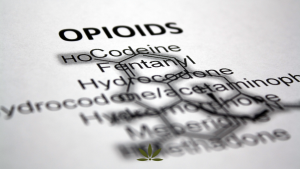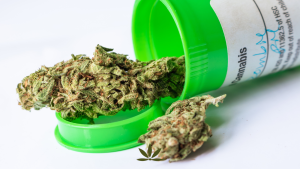Can Medical Cannabis Help Reduce Opioid Dependence & Withdrawal Symptoms?
In the late-1990s, new prescription drugs were making it into the homes of millions of Americans to help them deal with pain and other ailments. What was said to be “non-addictive” by drug companies soon caused an opioid epidemic, where prescription opioids have severely negatively impacted people’s lives, too often in fatal ways.
Opioid Use Disorder (OUD) affects three million US citizens. 16 million individuals worldwide have had or currently suffer from opioid use disorder (OUD). In order to qualify for this condition, a patient will meet two of 11 criteria including when opioid use interferes with obligations, continued use despite physical or psychological problems, the need for increased doses of the drug, and a wish to discontinue use. Many stay on opioids because they are afraid of the symptoms of withdrawal.
Can medical cannabis help people with opioid use disorder?
Why Are Opioids Addictive?
It is easy to understand why people may misuse opioid drugs they have been prescribed to manage pain, a practice that was very common in the first two decades of this century. To put it into perspective, 91.8 million individuals in the United States used prescription opioids in 2015. In 2017, the frequency of opioid overdoses in the United States was declared a national emergency.
What made the use of these drugs and epidemic is the frequency of use of opioid drugs for non-medicinal purposes. In the U.S., approximately 25 million people in the United States used opioids that were not prescribed between 2002 and 2011. Misuse of opioids occurs across all socioeconomic and educational backgrounds, and affects ALL people in the United States.

Opioids bind to receptors in the central and peripheral nervous systems that affect pain, and other bodily functions, which is why they are effective for pain relief for many. However, when these specific receptors are activated, the brain and body also experience intense feelings of euphoria.
Using opioids may become Opioid Use Disorder when someone is looking to recreate that first “high”, when they take more of the drugs that prescribed to manage pain symptoms, or simply to manage or avoid withdrawal. Withdrawal symptoms of opioid dependence can be painful with a variety of effects including hot/cold flashes, nausea, vomiting, diarrhea, sweating, insomnia, anxiety, pain, and other extremely comfortable symptoms.
Cannabis & Opioid Use Disorder
Many people who have been diagnosed with Opioid Use Disorder no longer want to let these drugs have a hold over their lives, and have sought different avenues for help. There are various ways that people have approached treatment for OUD, including rehabilitation programs, detox programs, support groups, and other medical programs.
Some have turned to cannabis as a way to manage Opioid Use Disorder, an approach that some people call the “substitution effect”. Since medical cannabis began to legalize across some states, researchers immediately began collecting data on how cannabis could help reduce opioid use.
Cannabis as Opioid Replacement Therapy
In 2017, the same year that opioid overdoses were declared a national crisis, researchers at UC at Berkley released a study in Cannabis and Cannabinoid Research where they surveyed 2,897 medical cannabis users who had been using opioids for pain.
97% responded that they were able to decrease their use of prescription drugs to manage pain with cannabis. 81% reported that cannabis was more effective on its own in dealing with pain than using opioids in conjunction with cannabis.

A study released in January 2023 that was published by the American Medical Association (AMA) showed that 30% of those with chronic pain were using cannabis for pain management, and turning away from opioid drugs.
Among adults with chronic pain in states with medical cannabis laws, 3 in 10 persons reported using cannabis to manage their pain. Most persons who used cannabis as a treatment for chronic pain reported substituting cannabis in place of other pain medications including prescription opioids.
In September 2022, a study by Florida State University College of Medicine surveyed over 2000 patients at Florida medical cannabis dispensaries. They found that 85.9% of medical cannabis patients using cannabis for pain reported that cannabis effectively reduced their pain symptoms. 79% of those who had their medical cannabis certification taking opioids for their pain reported that they reduced or stopped using opioid drugs after they started consuming cannabis.
Cannabis, The Endocannabinoid System, and Pain Management
The effectiveness of cannabis for pain management, like all cannabis medicine approaches, relies on engaging the Endocannabinoid System. can be viewed as a lock and key system, providing the foundation for how cannabinoids interact with our mind and body.
The ECS exists in the bodies of all mammals, acting as a regulator of all bodily systems, including, but not limited to those that regulate sleep, mood, appetite, memory, how our bodies experience pain, and reproduction, working to bring the body into balance or homeostasis.
The ECS is made of two main receptors, the CB1 and CB2, which are designed to act as “master conductors” of signals throughout the whole body, intuitively delivering cannabinoids, which exist already in our body AND in the cannabis plant, to the parts of the body that need them most.
When it comes to how our bodies respond to pain, endocannabinoids working on the CB1 receptor helps to naturally modulate the transmission of pain signals between the spinal cord and the brain. The same effect happens when phytocannabinoids from the cannabis plant such as THC and CBD work on the CB1 receptor.
In other words, cannabinoids influence how our brains receive and experience pain. This is why so many have turned to cannabis medicine and getting their medical cannabis certification to manage pain.
Studies Supporting Cannabis for Pain Management
Since pain management is a large reason people use cannabis medicine, there is a growing body on the way the plant helps people mitigate, or reduce uncomfortable feelings of pain.

Cannabis and Arthritis
A 2019 study called “Joints for Joints” showed the importance of the CB2 receptor in reducing inflammation of affected areas, showing great promise for those living with rheumatoid arthritis (RA).
This study showed that not only do cannabinoids affect how the brain experiences and interprets pain, but also have a significant role in down-grading the inflammatory response of certain pain related conditions.
Cannabis and Neuropathic Pain
A 2013 clinical study looked at the impact of vaporized cannabis on neuropathic pain that had been caused by chemotherapy. A control group was given a placebo, while others were given low and medium doses of vaporized cannabis.
Those who had used the cannabis experienced a 30% decrease in neuropathic pain and pain symptoms over those who were given placebo.
Cannabis for Multiple Sclerosis
A 2005 study tested the efficacy of whole-plant cannabis-based medicine on pain and sleep disturbances associated with Multiple Sclerosis (MS) in 64 patients.
Half of the participants who were given a placebo vs. those who had been given an oromucosal spray containing equal parts THC and CBD. The researchers saw that cannabis-based medicine was superior to placebo in reducing the mean intensity of pain and sleep disturbance associated with Multiple Sclerosis (MS).
Discover an Alternative to Opioids for Pain Management
As studies that look at the effectiveness of cannabis for pain increase, other data is showing that cannabis medicine is a helpful tool for many people to reduce their dependence off, or completely come off of, opioid drugs for pain management.
Compassionate Clinics of America provides supportive care and patient education and access to medical cannabis certifications for residents in Arizona, Arkansas, California, Connecticut, Delaware, Georgia, Illinois, Iowa, Louisiana, Maine, Maryland, Massachusetts, Michigan, Minnesota, Missouri, Montana, Nevada, New Jersey, New York, Ohio, Oklahoma, Pennsylvania, Texas, Utah, Vermont, Virginia, & West Virginia,.
You no longer have to be a prisoner of opioids or the fear of withdrawal. If you or someone you love are interested in exploring cannabis medicine for pain management, or as an alternative to opioids, don’t hesitate to reach out to us to book your telemedicine appointment.























